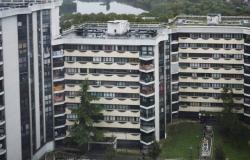The new coach of the Chinese team took office on May 1. He is already in Hangzhou, where the Chinese selections are taking place for the next World Championships and the Asian Games.
The Chinese program leaders approached me last January and then again in February. But I had declined their offers because I felt that the winning conditions were not met. We may offer you a good salary, but there’s no point in going there if we don’t put in place the necessary conditions to win.
Then, at the beginning of March, they called me back to find out what I needed in terms of equipment and support. And three days later, they said to me: “OK, we give it to you”
says the 66-year-old coach.
Pierre Lafontaine was coaching at a Canadian club in the late 1980s when he moved to the United States to develop athletes at a club in Phoenix, Arizona. In the early 2000s, he became a coach at the Australian National Development Centre. And after the Canadian debacle at the Athens Games in 2004, he returned to the country as coach and general manager of Swimming Canada, a position he held until 2013.
The creation of the National Center in Toronto and the hiring of coach Ben Titley, which propelled Canada among the world’s swimming powers, are among his accomplishments.
In turn, Lafontaine then found himself at the head of Canadian University Sport, Cross Country Canada and Cycling Canada. For a few years, he was back in the world of swimming. He was coaching swimmers at Carleton University and the Ottawa club when the Chinese program approached him.
***
I will be based at the Chinese National Center, which is in Beijing. China also operates another national center, which is located at high altitude. I will be coaching four or five national team athletes, and another of my mandates will be to help realign the high performance structure.
There is a large pool of people in China, but not everyone has access to a swimming pool. I want to help them establish a top-down system in which we will do development by age groups
explains Lafontaine.
That said, even if we manage to create a perfect structure, it doesn’t work if people don’t adhere to it out of conviction. My term is due to end in December 2024. Hopefully my Mandarin will be good enough by then to allow me to “sell” this structure without the help of an interpreter
he adds, laughing.
Political relations between Canada and China have been strained in recent years. On the world stage, the level of tension is also high, and China constantly makes headlines for issues of interference and respect for human rights. Was this aspect of the equation part of his thinking before accepting the position?
I am hired to make a sports structure and that is where I will devote all my energy. I am not here for any issue or political situation
he replies.
Pierre Lafontaine in 2008, with the Canadian team at the Beijing Olympics
Photo: The Canadian Press / Paul Chiasson
-***
Within the Chinese national program, Pierre Lafontaine joins two other renowned foreign coaches: the American Mark Schubert and the Australian Denis Cotterell.
Schubert was the head coach of Team USA from 2006 to 2010. He was part of the USA coaching teams at seven consecutive Olympic Games between 1984 and 2008. As for Cotterell, he is a member of the Hall of Fame of Australian sport, which is saying something when you know that the national sport of this country is swimming. Cotterell was notably the coach of Grant Hackett, who was the best 1500m swimmer on the planet in the 2000s.
I knew Denis Cotterell when I worked in Australia and I knew Mark Schubert when I worked in the United States. We will each lead a group of athletes while collaborating with Chinese coaches. In short, we will do mentoring. It’s no good coming to work here and leaving without having contributed to the development of the coaches
believes Pierre Lafontaine.
***
The Paris Games will begin in 15 months. And, obviously, the Chinese are going all out to maximize their chances of medals.
China won six medals at the last Games and they really want to improve. This is the reason why they seek the help of foreign coaches. Looking at the talents and genetic specimens that swim here, I think China could eventually – and I know it’s not easy – become one of the top three countries in the world in this sport.
The men’s team is very strong at the moment. On the men’s side, it is the Chinese who are first in the world in the 100m freestyle and the 100m breaststroke. And in the 200m freestyle, it’s a Chinese who holds 3rd place. The women’s team is a little further away, but we have 12 months before Olympic qualifying and 15 months before the Games
recalls Pierre Lafontaine.
Listening to him speak, the Chinese are well and truly in their final preparation phase.
It’s nice to have a training center at altitude, but you also have to prepare the athletes by allowing them to see, smell and taste France. We don’t want them to arrive in Paris in the summer of 2024 and feel a sense of wonder.
After the World Championships this summer, we will spend a few days in Paris with the national team. We will allow the athletes to go sightseeing, to see the swimming pool and the Olympic Village. The more comfortable they are with their surroundings, the better they will perform at the Games.
he concludes.
Pierre Lafontaine is coach of the Chinese national team. What a shock! It will probably take some time to get used to it.





